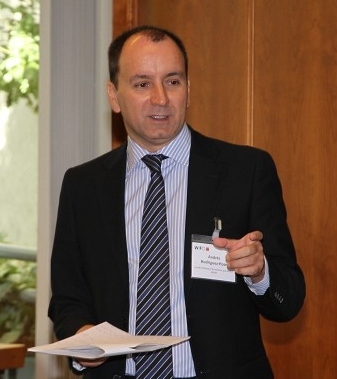- Andrés Rodríguez-Pose is the Princesa de Asturias Chair and a Professor of Economic Geography at the London School of Economics. He is the Director of the Cañada Blanch Centre LSE and was Head of the Department of Geography and Environment between 2006 and 2009.
- He chairs the High-Level Group on the future of Cohesion policy. This group is tasked with proposing the new Cohesion Policy for the European Union (EU) post 2027. The EU's Cohesion Policy is the largest development policy in the world, with a budget of €392 billion for the period 2021-2027.
- He has been President of the Regional Science Association International (RSAI) (2015-2017) and served as its Vice-President in 2014. He was also Vice-President (2012-2013) and Secretary (2001-2005) of the European Regional Science Association.
- He is a part-time Professor of Innovation at the Centre for Innovation Research, University of Stavanger (Norway). He has been visiting professor at several higher education institutions, including the College of Europe (Belgium), the University of Cambridge (UK), the University of Hannover (Germany), the University of Split (Croatia), and the Autonomous University of Madrid (Spain).
- He has a long track record of research in regional growth and inequality, fiscal and political decentralization, institutions, discontent and populism, innovation, migration, and development policies and strategies. This research is widely cited in academic circles. In the 2021 Stanford/Elsevier list of the 2% most cited scientists (which identifies close to 200,000 researchers across all areas of science), he was among the top 0.1% of researchers across all academic disciplines. He was ranked first worldwide in the field of urban and regional planning by scholarly citations in 2020. He also appears on Clarivate's Web of Science 2020, 2021 and 2022 lists of Highly Cited Researchers.
- His research is also influential in policy circles. In his areas of expertise, he has regularly acted as advisor to several Directorates of the European Commission, the World Bank, the Cities Alliance, the OECD, the International Labour Organization, UNCTAD, the United Nations Development Programme, the Food and Agriculture Organization, the European Investment Bank, the Inter-American Development Bank, the Development Bank of Latin America, the Asian Development Bank, or the African Union.
- Among his honours is the 2018 ERSA Prize in Regional Science, considered to be among the highest awards in the field. He has been a holder of a European Research Council (ERC) Advanced Grant and of a prestigious Royal Society-Wolfson Research Merit Award. Other past academic prizes include a Leverhulme Trust Major Research Fellowship, a Philip Leverhulme Prize, and the Royal Geographical Society Gill Memorial Award. The latter two were awarded for his contribution to the understanding of regional disparities and development.
- In 2019 he received Doctorates Honoris Causa from Utrecht University (the Netherlands) and Jönköping University (Sweden).
- His books include The dynamics of Regional Growth in Europe (Oxford, Oxford University Press, 1998), The European Union: Economy, Society, and Polity (Oxford, Oxford University Press, 2002), Local and Regional Development (London, Routledge, 2006 and 2017 2nd Edition), Innovation and regional growth in the European Union (Berlin and New York, Springer, 2011), or Technology and Industrial Parks in Emerging Countries (Heidelberg and New York, Springer, 2014). Some of his books have been translated into Chinese, Italian, and Spanish. He has also published more than 240 articles in peer-reviewed journals.
- He is an editor of Economic Geography, and sits on the editorial board of 41 other scholarly journals, including many of the leading international journals in economic geography, human geography, regional science, and management.
- Between 1999 and 2016 he was editor of Environment and Planning C, acting as joint chief editor from 2008 onwards. He was also editor-in-chief of the Journal of Geographical Systems between 2019 and 2021.



